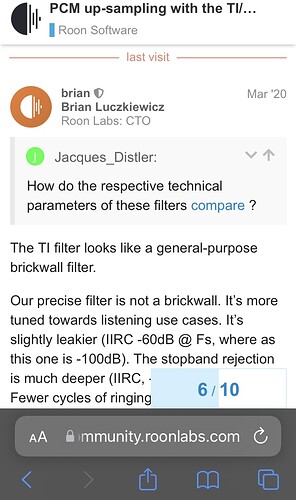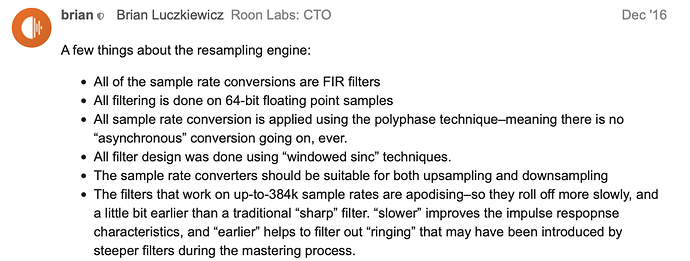hihi, ok ok…did quit TIDAL too…lol…
…and this is why I say that Jussi knows more than you or me or any one else I know on this topic.
If it’s authority on the subject of sampling and accurate reconstruction you’re after then go to the source 
To be fair, you don’t know me. It’s a good idea not to make assumptions about people’s qualifications and instead focus on the subject at hand.
I think it is safe to say that Jussi knows more about this stuff than you do. If you want to dispute that, post your qualifications. Otherwise, you are just some handle on a forum on the Internet.
I admit I did not look, but the two ‘linear phase’ filter options are ‘precise’ and ‘smooth’, so I made an educated guess that the former means ‘fast’ and the latter ‘slow’. By all means, anybody who knows better should correct me.
It’s not really possible to compare the inner workings of each piece of software. Jussi is understandably protective of his intellectual property. The HQ Player manual (available in the folder containing the downloaded software) sets out functional descriptions of the various filters and modulators in a very broad brush way.
It’s clear that HQ Player has a greater variety of filters and modulators, some of which are right at the limits of current hardware.
All I can say about the topic is that I like the sound of Roon/HQ Player with particular settings better than Roon alone. So if that counts as ‘better’ for me, then I’m a yes.
There need not be any mystery here. You can try HQ Player without a license, limited to 30 minute sessions. That can answer the question for your system and ears.
Well when someone says “kind of says it all” it comes across as informed (and arrogant by the way).
But you were just guessing?
But if you read what brian (who wrote the code…) already wrote, it is not a brickwall filter?
Meanwhile HQPlayer offers sinc filters, possibly the longest available in any software for real time DSP… obviously can be made longer for offline files.
Just get HQPlayer man
![]()
It may be the other way around. Precise and smooth are descriptions of the filters in the frequency domain with precise having a steeper rejection slope and smooth a more gradual slope. A steeper slope usually requires a longer filter, meaning a slower transit time than a shorter filter.
High frequencies take longer than low frequencies to traverse a filter so a linear phase filter will slightly delay high frequencies to preserve phase response.
Thanks Andy. I was thinking about the roll-off when I said ‘fast’ and ‘slow’, so I think we’re in agreement.
Then you need HQPlayer if your personal preference is closer (not ideal) to ideal sinc filter
Longer filter, more taps, closer to ideal sinc filter
![]()
What Rob Watts dreams of every night :

Which is what’s got me interested ![]()
Edit:
Yeah, it’s a long wait for an ideal sinc filter in all sorts of ways ![]()
The great thing is there are so many options in HQPlayer.
You can try the sinc filters and all the others options and over time you may (or may not) find you enjoy music more with the apodozing (not sinc !) filters offered in HQPlayer.
I’ll admit I’m in the accuracy over euphonic camp here, but as you say, there’s something for everyone. I really will have to get this set up and working for myself 
hihi, takes atleast a week…lol…but it is lots of fun 
I appreciate the invitation. Should I desire to up-sample during playback, I can design my own filter and plug it in Roon. That way, I know exactly what I’m getting, as opposed to a vague description. For example, for my offline sample rate conversions, I’m currently using a 400K-tap sinc filter with a Chebyshev window.
Is this a sinc filter?
If it is a windowed sinc function it is no longer true sinc following Whittaker-Shannon interpolation filter… ?

